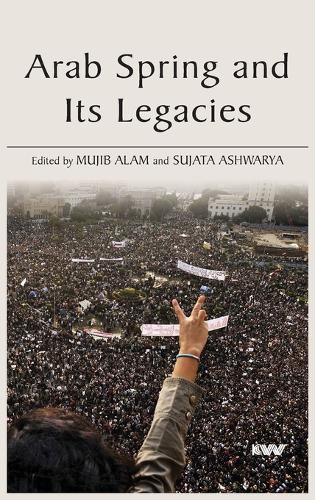Readings Newsletter
Become a Readings Member to make your shopping experience even easier.
Sign in or sign up for free!
You’re not far away from qualifying for FREE standard shipping within Australia
You’ve qualified for FREE standard shipping within Australia
The cart is loading…






This title is printed to order. This book may have been self-published. If so, we cannot guarantee the quality of the content. In the main most books will have gone through the editing process however some may not. We therefore suggest that you be aware of this before ordering this book. If in doubt check either the author or publisher’s details as we are unable to accept any returns unless they are faulty. Please contact us if you have any questions.
The essays in this edited volume seek to understand the regional and international ramifications of the wave of protest demonstrations that swept across West Asia and North Africa in the early 2010s, both on the ground and online. Dissatisfaction with political repression and corruption, economic difficulties and inequities, and a desire for freedom and democracy all played a role in the Arab Spring uprisings. It deposed long-standing dictatorships, ushering in a period of insecurity and instability that would have long-term consequences for the region's political economy and international relations. Although the protests have ended, the legacy of that turbulent era will live on, most notably in the acceleration of regional change and transformation.
"At a time when many observers regard the Arab Spring as an established fact, this volume offers a sober reflection by situating the events within a historical structural setting and a complex international geopolitical context. A highly recommended text, especially for those seeking a nuanced understanding of the interactions between local actors and non-Western powers, particularly India and China, as well as how and why their roles are constructed as they appear in today's debate."
"The Arab Spring was a watershed moment in the Arab world. It has cast a long shadow over the West Asian region and beyond. A decade later, it is appropriate to reflect on the magnitude of the phenomenon and better understand current reality in its context. The book, written from the perspectives of various authors, is a welcome addition to the literature on the Arab Spring."
Jawaharlal Nehru University, New Delhi
"This volume adds to our understanding of the dynamics and legacies of the Arab Spring at the domestic, regional, and international levels. The included analyses draw on a diverse and rich repertoire to shed light on some of the most pressing issues in post-Arab Spring politics and society."
"Arab Spring and its Legacies is comprehensive, examining a rather complex subject in depth while combining clarity and sound historical reasoning. Both scholars and the general public will benefit from this work."
Symbiosis University, Pune
$9.00 standard shipping within Australia
FREE standard shipping within Australia for orders over $100.00
Express & International shipping calculated at checkout
This title is printed to order. This book may have been self-published. If so, we cannot guarantee the quality of the content. In the main most books will have gone through the editing process however some may not. We therefore suggest that you be aware of this before ordering this book. If in doubt check either the author or publisher’s details as we are unable to accept any returns unless they are faulty. Please contact us if you have any questions.
The essays in this edited volume seek to understand the regional and international ramifications of the wave of protest demonstrations that swept across West Asia and North Africa in the early 2010s, both on the ground and online. Dissatisfaction with political repression and corruption, economic difficulties and inequities, and a desire for freedom and democracy all played a role in the Arab Spring uprisings. It deposed long-standing dictatorships, ushering in a period of insecurity and instability that would have long-term consequences for the region's political economy and international relations. Although the protests have ended, the legacy of that turbulent era will live on, most notably in the acceleration of regional change and transformation.
"At a time when many observers regard the Arab Spring as an established fact, this volume offers a sober reflection by situating the events within a historical structural setting and a complex international geopolitical context. A highly recommended text, especially for those seeking a nuanced understanding of the interactions between local actors and non-Western powers, particularly India and China, as well as how and why their roles are constructed as they appear in today's debate."
"The Arab Spring was a watershed moment in the Arab world. It has cast a long shadow over the West Asian region and beyond. A decade later, it is appropriate to reflect on the magnitude of the phenomenon and better understand current reality in its context. The book, written from the perspectives of various authors, is a welcome addition to the literature on the Arab Spring."
Jawaharlal Nehru University, New Delhi
"This volume adds to our understanding of the dynamics and legacies of the Arab Spring at the domestic, regional, and international levels. The included analyses draw on a diverse and rich repertoire to shed light on some of the most pressing issues in post-Arab Spring politics and society."
"Arab Spring and its Legacies is comprehensive, examining a rather complex subject in depth while combining clarity and sound historical reasoning. Both scholars and the general public will benefit from this work."
Symbiosis University, Pune